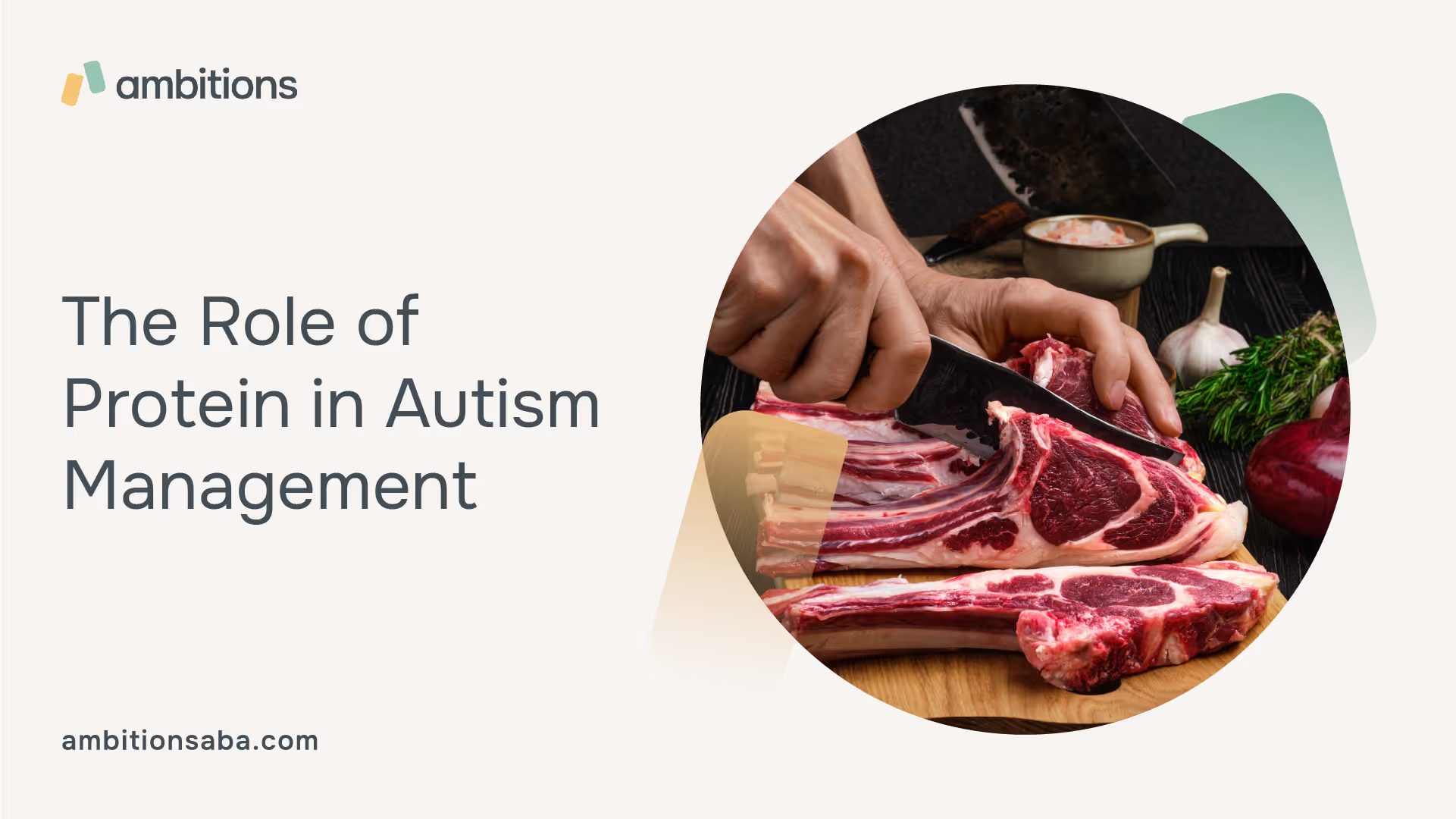Exploring the Role of ABA in Enhancing Emotional Balance for Kids with Autism

Does Meat Cause Autism?
When it comes to the relationship between meat consumption and autism, it's important to separate fact from fiction. There have been claims suggesting a potential link between the two, but it's crucial to understand the scientific evidence to make informed decisions.
Understanding the Autism Spectrum
Autism is a complex neurological condition that affects individuals in different ways. It is characterized by challenges in social interaction, communication, and repetitive behaviors. The autism spectrum is broad, encompassing a range of abilities and challenges. Each person with autism is unique, with their own strengths and areas of difficulty.

Debunking the Meat-Autism Connection
There have been claims suggesting that consuming meat may contribute to the development or exacerbation of autism symptoms. However, these claims are not supported by credible scientific evidence. Research studies examining the relationship between meat consumption and autism have not found a direct causal link between the two.
While it is true that some individuals with autism may have dietary sensitivities or allergies, including allergies to specific types of meat, these cases are not representative of the entire autism population. It is crucial to distinguish between individual sensitivities or allergies and a general connection between meat consumption and autism.
To better understand the role of diet in autism management, it is necessary to explore the broader dietary considerations for individuals with autism. This includes examining the claims made about various diets and their impact on autism symptoms.
By separating fact from fiction, we can focus on evidence-based strategies for supporting individuals with autism and promoting their overall well-being. The next section will delve into the broader role of diet in autism management, providing insights into the importance of a balanced diet for individuals on the autism spectrum.

The Role of Diet in Autism
When it comes to autism, there is often a lot of discussion surrounding the role of diet in its management and potential causes. It's important to explore these claims and understand the importance of a balanced diet for autism management.
Exploring the Dietary Claims
Dietary claims linking meat consumption to autism have gained attention in recent years. However, it's crucial to separate fact from fiction. The notion that meat causes or worsens autism has not been supported by credible scientific evidence. Many of these claims are based on anecdotal stories or unsubstantiated theories, rather than rigorous research.
To date, there is a lack of scientific consensus on any specific dietary factor directly causing or exacerbating autism. It's important to approach dietary claims with skepticism and rely on evidence-based research to inform decisions regarding diet and autism management.
Importance of a Balanced Diet for Autism Management
While there is no direct link between meat consumption and autism, the role of diet in autism management should not be overlooked. A balanced diet is essential for individuals on the autism spectrum, just as it is for everyone else.
A well-rounded diet ensures that individuals with autism receive the necessary nutrients for optimal growth, development, and overall health. It's important to focus on providing a variety of nutrient-dense foods, including fruits, vegetables, whole grains, lean proteins, and healthy fats.
Protein, in particular, plays a crucial role in autism management. It is essential for the growth and repair of body tissues and is involved in the production of important neurotransmitters that affect mood and behavior. Meat is a valuable source of high-quality protein, as well as other essential nutrients such as iron, zinc, and B vitamins.
By focusing on a well-balanced diet that includes a variety of nutrient-rich foods, parents and caregivers can support the overall health and well-being of individuals with autism. It's important to consult with healthcare professionals and registered dietitians who specialize in autism to develop personalized meal plans that meet the unique needs of each individual.
Examining the Scientific Evidence
To determine the relationship between meat consumption and autism, it is crucial to examine the scientific evidence available. By exploring research studies conducted in this area, we can gain a better understanding of the subject.
Research Studies on Meat and Autism
Numerous research studies have been conducted to investigate the potential link between meat consumption and autism. These studies have examined various aspects, including the impact of certain components found in meat, such as proteins and amino acids, on the development and management of autism.
While some studies have suggested a possible association between certain dietary factors and autism, it is important to note that these studies have limitations. The research conducted in this field has not provided consistent or conclusive evidence to establish a direct causal link between meat consumption and autism.
Lack of Credible Evidence Supporting the Claim
Despite media attention and anecdotal reports, it is essential to highlight the lack of credible evidence supporting the claim that meat consumption causes or exacerbates autism. The scientific community acknowledges that autism is a complex neurodevelopmental disorder influenced by various genetic and environmental factors.
The current body of research does not provide substantial evidence to support the notion that meat consumption plays a significant role in the development or management of autism. It is crucial to approach such claims with caution and rely on scientifically rigorous studies that undergo peer review and replication to establish causal relationships.
Parents and caregivers should consult healthcare professionals, such as pediatricians or registered dietitians, to discuss appropriate dietary choices for their children on the autism spectrum. These professionals can provide evidence-based guidance on nutrition and offer personalized recommendations to support overall health and well-being.
By critically examining the available scientific evidence, we can better understand the relationship between meat consumption and autism. It is important to remain informed and rely on reputable sources when seeking information about autism and its potential dietary implications.
Nutritional Benefits of Meat
Meat is a valuable source of essential nutrients that play a crucial role in the overall health and well-being of individuals. While there have been claims that meat consumption is linked to autism, it is important to separate fact from fiction and examine the scientific evidence. Let's explore the nutritional benefits of meat and its significance for individuals with autism.
Essential Nutrients Found in Meat
Meat is rich in several essential nutrients that are vital for the proper functioning of the body. These nutrients include:
These nutrients are not only important for individuals with autism but also for the general population. However, it's worth noting that the nutritional needs of individuals with autism may vary, and it's important to consult a healthcare professional or a registered dietitian for personalized dietary recommendations.
The Role of Protein in Autism Management
Protein is a macronutrient found abundantly in meat and serves as a crucial building block for the body. It is essential for the growth, repair, and maintenance of body tissues, including muscles, organs, and the brain. Protein also plays a vital role in the production of neurotransmitters, which are chemical messengers involved in brain function and communication.
For individuals with autism, protein intake is particularly important as it can contribute to the management of certain symptoms. Protein-rich foods, such as meat, can help regulate blood sugar levels and promote a more stable mood and behavior. Additionally, protein can aid in improving focus and concentration, which may be beneficial for individuals with autism who experience difficulties in these areas.
Incorporating meat into a well-rounded diet can provide individuals with autism the necessary protein and other essential nutrients they need for optimal growth and development. However, it's essential to ensure that the meat is prepared and cooked in a safe and healthy manner.
By understanding the nutritional benefits of meat and its role in supporting overall health, individuals can make informed decisions about their dietary choices. It's important to remember that a well-balanced diet that includes a variety of nutrient-rich foods is key for individuals with autism and can contribute to their overall well-being.
Promoting a Well-Balanced Diet
Ensuring a well-balanced diet is essential for the overall health and well-being of children with autism. While there is no scientific evidence to support the claim that meat causes autism, it's important to provide children with a variety of nutrient-rich foods to support their growth and development. Here are some dietary recommendations and tips for including meat in a healthy meal plan for children with autism.
Dietary Recommendations for Children with Autism
When it comes to the dietary needs of children with autism, it's crucial to focus on providing a well-rounded and nutritious diet. Here are some general dietary recommendations:
- Variety of Foods: Encourage a wide range of foods to ensure the intake of different nutrients. Include fruits, vegetables, whole grains, lean proteins, and dairy or dairy alternatives.
- Balanced Meals: Aim to create balanced meals that include a mix of macronutrients, such as carbohydrates, proteins, and healthy fats. This can help provide sustained energy and support overall health.
- Hydration: Ensure your child stays hydrated by offering water throughout the day. Limit sugary drinks and opt for water as the primary beverage.
- Meal Structure: Establish a routine for meals and snacks. Consistency and structure can be beneficial for children with autism and help create a positive mealtime environment.
- Individual Preferences: Consider your child's sensory sensitivities and preferences when planning meals. Adapt the texture, temperature, and presentation of food to make mealtime more enjoyable.
For more specific guidance on dietary recommendations for children with autism, consult a registered dietitian or healthcare professional who specializes in autism nutrition.
Including Meat in a Healthy Meal Plan
Meat can be a valuable source of essential nutrients for children with autism. It is rich in several important nutrients that support overall growth and development. Here are some key nutrients found in meat and their benefits:
When including meat in a healthy meal plan for children with autism, consider the following tips:
- Choose Lean Cuts: Opt for lean cuts of meat to reduce the intake of saturated fats. Examples include skinless poultry, lean cuts of beef or pork, and fish.
- Cooking Methods: Use healthier cooking methods such as baking, grilling, or broiling, instead of frying. This helps to minimize the added fat content.
- Portion Control: Serve appropriate portion sizes based on your child's age and individual needs. A registered dietitian can provide guidance on portion sizes specific to your child.
- Food Safety: Ensure proper food handling and cooking temperatures to prevent the risk of foodborne illnesses. Cook meat thoroughly and store leftovers safely.
Remember, if your child has specific dietary restrictions or allergies, consult a healthcare professional or registered dietitian to create a meal plan that meets their individual needs. By promoting a well-balanced diet that includes a variety of nutrient-rich foods, including meat in moderation, you can support your child's overall health and development.
The Benefits of Early Intervention for Autism
Early intervention is a critical component of effective treatment for autism. Research has shown that children who receive early intervention services, such as behavioral therapy and speech therapy, have better outcomes than those who do not. However, it's important to note that early intervention is not a one-size-fits-all solution, and it's essential to find the right services that fit the individual needs of each child.
In this article, we will dive deeper into the benefits of early intervention for autism. For instance, early intervention can help improve communication skills, which can greatly enhance a child's ability to interact with others and form meaningful relationships. Additionally, early intervention can help children with autism develop better socialization skills, which can lead to increased confidence and independence as they grow older.
There are many different types of intervention services available for children with autism, including Applied Behavior Analysis (ABA), speech therapy, occupational therapy, and more. It's important for parents and caregivers to explore the different options available and work closely with their child's healthcare providers to determine the best course of action.
Overall, early intervention is a crucial part of helping children with autism reach their full potential. By providing the right services and support at the right time, we can help these children thrive and lead happy, fulfilling lives.
Nutritional Guidance for Children with Autism
While there is no evidence linking meat consumption to autism, it's important for families of children with autism to seek appropriate nutritional guidance. Some children with autism may have food sensitivities or allergies that could impact their dietary needs.
Fortunately, there are many resources available for families seeking nutritional guidance for their child with autism. One option is to consult a registered dietitian who specializes in working with children with special needs. These professionals can help identify any dietary concerns and create a personalized nutrition plan based on the child's specific needs.
Additionally, organizations such as the Autism Nutrition Research Center (ANRC) offer resources and support for families seeking information about nutrition and autism. The ANRC provides evidence-based research on various dietary interventions, as well as educational materials and workshops for parents and caregivers.
It's important to note that individualized nutritional guidance should be sought for each child with autism, as each child may have unique dietary needs and requirements. By working closely with qualified healthcare professionals and utilizing available resources, families can ensure that their child receives appropriate nutritional support to promote optimal health and well-being.
FAQs
Is organic meat better for children with autism?
There is no scientific evidence to suggest that organic meat is better for children with autism than conventionally raised meat. However, choosing organic meats can reduce exposure to antibiotics, hormones, and other potentially harmful substances commonly used in conventional animal agriculture.
Should children with autism avoid processed meats?
Processed meats such as hot dogs, bacon, and deli meats have been linked to an increased risk of cancer and other health problems. While there is no evidence linking processed meats specifically to autism, it's generally recommended that all individuals limit their intake of processed foods.
Can a gluten-free or casein-free diet help manage symptoms of autism?
Some parents and caregivers have reported improvements in behavior and communication after eliminating gluten (a protein found in wheat) or casein (a protein found in dairy) from their child's diet. However, there is limited scientific evidence to support these claims, and any dietary changes should be made under the guidance of a qualified healthcare professional.
Summary
In conclusion, there is no evidence to suggest that meat causes autism. While a balanced diet is important for overall health, there is no need to eliminate meat from the diet of individuals with or without autism. If you have concerns about your child's dietary needs, it is important to consult with a qualified healthcare professional or registered dietitian.

